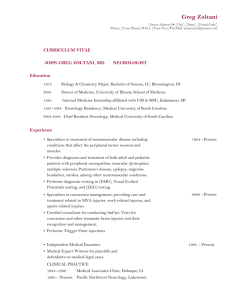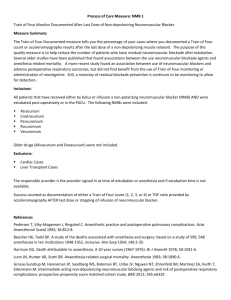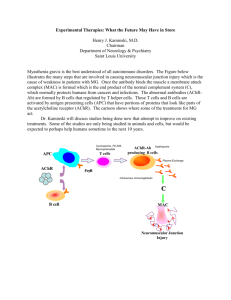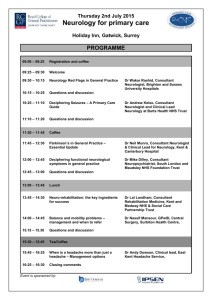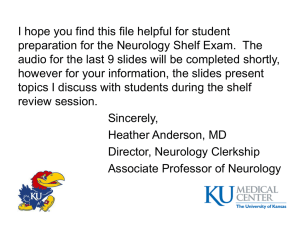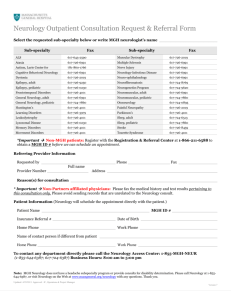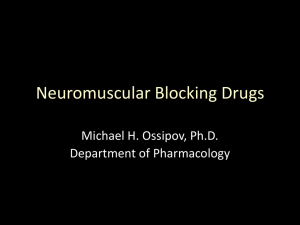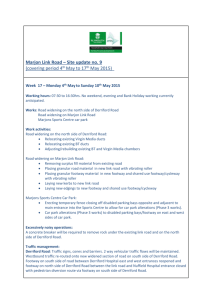STANDARD FORMAT FOR CONSULTANT JOB DESCRIPTION
advertisement
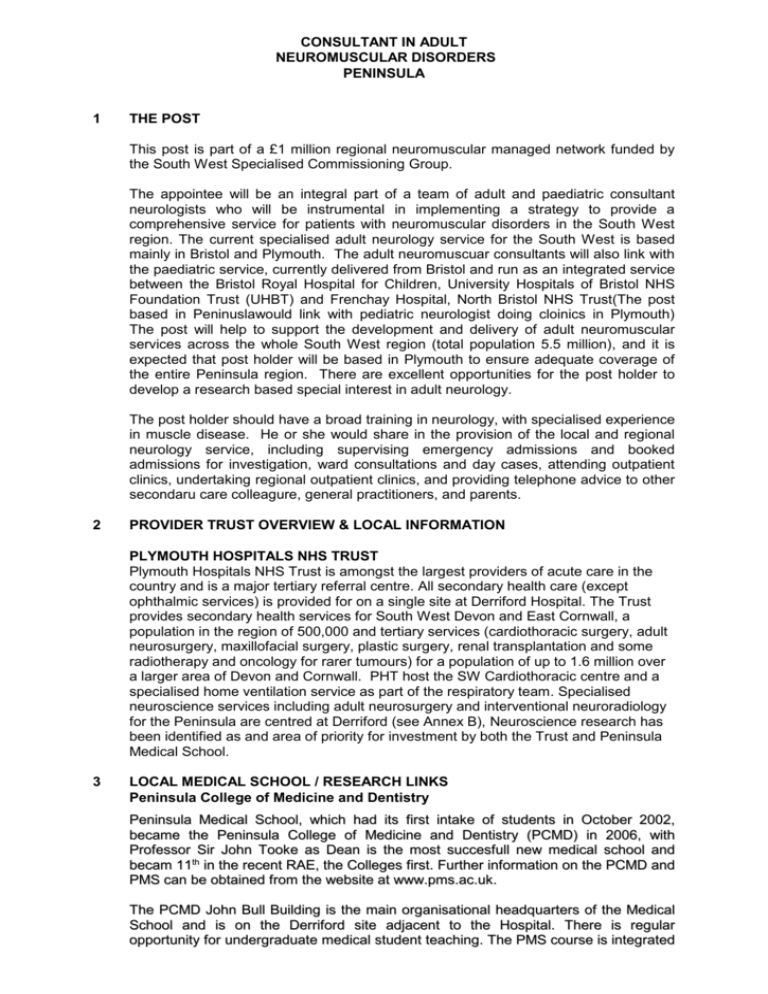
CONSULTANT IN ADULT NEUROMUSCULAR DISORDERS PENINSULA 1 THE POST This post is part of a £1 million regional neuromuscular managed network funded by the South West Specialised Commissioning Group. The appointee will be an integral part of a team of adult and paediatric consultant neurologists who will be instrumental in implementing a strategy to provide a comprehensive service for patients with neuromuscular disorders in the South West region. The current specialised adult neurology service for the South West is based mainly in Bristol and Plymouth. The adult neuromuscuar consultants will also link with the paediatric service, currently delivered from Bristol and run as an integrated service between the Bristol Royal Hospital for Children, University Hospitals of Bristol NHS Foundation Trust (UHBT) and Frenchay Hospital, North Bristol NHS Trust(The post based in Peninuslawould link with pediatric neurologist doing cloinics in Plymouth) The post will help to support the development and delivery of adult neuromuscular services across the whole South West region (total population 5.5 million), and it is expected that post holder will be based in Plymouth to ensure adequate coverage of the entire Peninsula region. There are excellent opportunities for the post holder to develop a research based special interest in adult neurology. The post holder should have a broad training in neurology, with specialised experience in muscle disease. He or she would share in the provision of the local and regional neurology service, including supervising emergency admissions and booked admissions for investigation, ward consultations and day cases, attending outpatient clinics, undertaking regional outpatient clinics, and providing telephone advice to other secondaru care colleagure, general practitioners, and parents. 2 PROVIDER TRUST OVERVIEW & LOCAL INFORMATION PLYMOUTH HOSPITALS NHS TRUST Plymouth Hospitals NHS Trust is amongst the largest providers of acute care in the country and is a major tertiary referral centre. All secondary health care (except ophthalmic services) is provided for on a single site at Derriford Hospital. The Trust provides secondary health services for South West Devon and East Cornwall, a population in the region of 500,000 and tertiary services (cardiothoracic surgery, adult neurosurgery, maxillofacial surgery, plastic surgery, renal transplantation and some radiotherapy and oncology for rarer tumours) for a population of up to 1.6 million over a larger area of Devon and Cornwall. PHT host the SW Cardiothoracic centre and a specialised home ventilation service as part of the respiratory team. Specialised neuroscience services including adult neurosurgery and interventional neuroradiology for the Peninsula are centred at Derriford (see Annex B), Neuroscience research has been identified as and area of priority for investment by both the Trust and Peninsula Medical School. 3 LOCAL MEDICAL SCHOOL / RESEARCH LINKS Peninsula College of Medicine and Dentistry Peninsula Medical School, which had its first intake of students in October 2002, became the Peninsula College of Medicine and Dentistry (PCMD) in 2006, with Professor Sir John Tooke as Dean is the most succesfull new medical school and becam 11th in the recent RAE, the Colleges first. Further information on the PCMD and PMS can be obtained from the website at www.pms.ac.uk. The PCMD John Bull Building is the main organisational headquarters of the Medical School and is on the Derriford site adjacent to the Hospital. There is regular opportunity for undergraduate medical student teaching. The PMS course is integrated and groundbreaking in its approach, the first clinical students have graduated and students in all clinical years are on the wards. The neurology department is involved in teaching parts of several courses and in clinical skills teaching. The appointee will be able to develop a teaching commitment depending on training, experience and interest, although this post is primarily focused on research. Research and teaching: Neuroscience research is one of the major research themes at PCMD, complementing existing strengths such as the Clinical Trials Unit, cognitive psychology, Neurobiology and Neuropathology at PHT. Neurobiology research at PCMD led by Prof. C Oliver Hanemann is disease-oriented with the overall aim of working from bench to bedside. Research is focused on specific disease areas, neurodegeneration especially in MS and motor neuron disease, neuronal migration disorders, disorders of vesicle transport and brain tumours. These disease areas represent areas of great medical need and we perform translational work in each disease area. Our research is further underpinned by common underlying basic themes. To achieve our goal a variety of model systems including in vitro models and other disease models are employed as well as modern techniques of protein biochemistry and molecular biology to high resolution imaging of live cells. Research groups are situated in state of the art laboratories next to the hospital. Strong laboratory research is complemented by expertise in designing, conducting and analysing multicentre clinical trials and epidemiological research in the NIHR registered Peninsula Clinical Trials Unit. Several multicentre clinical trials and other large scale longitudinal studies are coordinated from the Plymouth offices of the PenCTU, including the £3m MRC funded CUPID study. In addition, the Clinical Neurology Research Group has recently been awarded a £2m NIHR programme grant to develop methodology in neurodegenerative diseases. The bench to bedside approach is fundamental to the close collaboration between different institutions across the South W est. There are currently 4 academic neurologists in post. Professor John Zajicek has a special interest in neurological inflammatory disorders and has completed several large clinical trials looking at the effects of cannabinoids in patients with multiple sclerosis. Dr Jeremy Hobart is reader and has interests in neuro-rehabilitation and outcome measures. He has published widely and is very active in these research areas. Professor C Oliver Hanemann has clinical interests in neuromuscular disease with a focus on peripheral nerves and motor neurons and has research interests in nerve sheath tumours. Dr Camille Carroll is an MRC research fellow and honorary Senior Lecturer, with a research programme into mechanisms of cell death in Parkinson’s disease. Plymouth neuroscience is firmly involved in the new structures for research in the UK. Prof Zajicek is deputy lead for the SW Dementia and Neurodegenerative Disease Research Network (DeNDRoN), with infrastructure support being available through DeNDRoN as well as the Stroke Research Network (SRN). Prof Zajicek is also joint Clinical Director of the Peninsula Comprehensive Local Research Network. Prof C Oliver Hanemann is Associate Medical Director for Research &Development (R&D) in Plymouth Hospitals Trust. There is also a neuroscience theme within the PenCLAHRC, which will also facilitate the addressing of relevant clinical research questions. There are close links with the Department of Medical Statistics in the University of Plymouth (led by Prof David W right) and the School of Computing (led by Prof Emmanuel Ifeachor). These collaborations have led to the recent £2m NIHR programme grant in trial methodology. 4 NEUROLOGY SERVICE & STRUCTURE 2 Department of Neurology The Department of Neurology provides a comprehensive neurological service for the populations of Plymouth and Torbay Health Districts and part of East Cornwall, a catchment population of approximately 715,000. The Department has facilities for elective and emergency admissions and the assessment and rehabilitation of patients with chronic neurological disability. Consultants from Plymouth (Drs Sadler, Edwards and W eatherby) travel to Torbay to provide an outpatient service and to provide inpatient ward referral opinions to support the 2 Torbay-based neurologists (Dr R Aylward, Dr I Imam). W e maintain close links with Torbay hospital and any neurologists based there and also provide an outpatient MS service (Dr Hobart) and a referral pathway for patients with complex neurological conditions who need specialist inpatient care. The Department works closely with the Departments of Neurosurgery, Clinical Neurophysiology, Neuroradiology, Neuropathology and Neuropsychology and also with experienced nursing staff and para-medical staff. Plymouth Hospitals NHS Trust is in a good position of deliver both the local and specialised components of the new neuromuscular service to the Peninsula population; with the largest Neurology department south of Bristol, the Trust already offers patients access to a neuromuscular outpatient clinic and incorporates other key services as a recognised Neurosciences centre that would allow an enhanced level of specialist service provision and teaching. To deliver the service additional resources are needed. Department of neurosurgery: The South-W est Neurosurgical Unit provides a comprehensive Neurosurgical Service to the population of Devon, Cornwall, the Isles of Scilly, and part of Somerset. The population of this area is approximately 2.0 million, but rises considerably during the summer months, with the influx of visitors from other parts of the U.K. and from abroad. Close links exist with the District General Hospitals situated in Truro, Barnstaple, Exeter, Torbay, Taunton and Yeovil. Helicopter air ambulances facilitate rapid transfer of patients between outlying hospitals and Plymouth. The department has its own intensive care and high dependency areas. There is some specialisation within the department: Mr James Palmer - image guided tumour and stereotactic surgery, lateral skull base surgery ; Mr Lou Pobereskin - transphenoidal surgery, and lumbar disc surgery; Mr Tim Germon - complex spinal surgery; Mr Peter W hitfield – tumour and vascular surgery; Miss Anne Moore – anterior and central skull base surgery, vascular surgery; Mr Paul Fewings – tumour and vascular surgery; Mr Nagarajan Sudhakar – complex spinal surgery; Mr Nicholas Haden – tumour and complex spinal surgery. Commander Steven Smith – lumbar spinal surgery. A stereotactic radiosurgery service is provided, in conjunction with the Clinical Oncology service. Department of neurophysiology: The department is staffed by a full-time consultant clinical neurophysiologist and dedicated technicians. The department has all the facilities for modern neurophysiological investigations including nerve conduction studies, electromyography, electroencephalography, 24 hour EEG recordings and 24 hour telemetry, visual, auditory and somatosensory evoked potentials, central motor conduction times and sleep recordings. In addition, research projects are undertaken in conjunction with the Universities of Plymouth and Sheffield, and this latter research group has produced 2 PhDs. Department of neuroradiology: 3 This department is staffed by 4 full-time neuroradiologists, three of whom are interventional neuroradiologists. There are facilities for angiography, myelography, CT and MRI scanning and interventional neuro-radiology. A weekly meeting is held with the department of neurology for review of neuroradiology. Department of neuropathology: This is staffed by two full-time clinical neuropathologist ( Drs David Hilton and Aditya Shivane) who have an academic commitment and monthly neuropathology meetings are held on a Thursday morning. Neurological rehabilitation: There is a Professor of Stroke Rehabilitation, one full-time Consultant in Neurological Rehabilitation and a staff grade in rehabilitation. There is a Stroke Rehabilitation Unit and a 21-bedded neurological rehabilitation unit (Plym) at Mount Gould Hospital. Neuropsychology: There are two consultant neuropsychologists and other members of an expanding department. A full range of neuropsychological assessment is available. Pain clinic: The Department has close links with the Pain Clinic, which is staffed by 5 Consultant Anaesthetists, with a complement of 3 beds. Dr Luscombe (Clinical director for neurosciences as a whole) provides a comprehensive intrathecal baclofen and morphine sevice. Dorsal column stimulators and radiofrequency treatment are also available. The Neurology Department also has links with the Department of Clinical Genetics which is a sub-regional service based at the Royal Devon and Exeter Hospital in Exeter. In addition PHT has an established respiratory team for adult and paediatric patients (Dr Phil Hughes (respiratory consultant) and Jonathan Palmer (respiratory specialist nurse); The appointee will be encouraged to develop a clinical and research interest in a subspecialty within adult neuroscience, preferably one which will complement the subspecialty interests of the present consultants. He/she will also contribute to teaching in neurology at both undergraduate and postgraduate level and will assist in developing and evaluating protocols for the investigation and management of adults with acute and chronic neurological problems. All Consultants are encouraged to initiate and partake in research in their specialities, whether in basic or clinical areas or in the evaluation of health care provision. 5 LABORATORY SERVICES Derriford/PHT has extensive laboratory facilities under the roof of the combined laboratories. These include clinical chemistry and in neuropathology with full clinical pathology accreditation status. Adjacent to the hospital are purpose build research laboratories from the medical school. 6 THE NEUROMUSCULAR SERVICE The South West was recently successful in obtaining £1 million from the South West Specialised Commissioning Group, with the specific remit of improving access, the quality of care, and survival for both adults and children with neuromuscular conditions, through the development of a managed clinical network and significant expansion of staff. The post holder will work together with other consultants with 4 paediatric and adult neuromuscular interests and other members of the network (a network manager, care co-ordinators, specialised physiotherapists, and a psychologist), with the specific remit of developing and delivering services for children and adults with neuromuscular conditions. The post holder will sit on the Implementation Group as part of the South West Neuromuscular Group, and will be expected to lead the process of developing the managed clinical network and be instrumental in its delivery. The post holder will be expected to develop and streamline the local service for the management of adult neuromuscular disease in the South West/Peninsula, including facilitating smooth transition between paediatric and adult services. Duties will include mainly out-patient work, but with inpatient and other work as required. The post holders will be expected to initiate, establish and maintain one-stop outreach clinics with other provider Trusts in their geographical areas where appropriate. The post holder will be expected to provide clinical leadership across all areas of adult neuromuscular services. This includes clinical leadership in the development of joint respiratory, scoliosis, cardiac, and genetic services for patients with neuromuscular conditions. The post holder will be responsible for the assembly of the IT team which will deliver the IT infrastructure for the managed clinical network, and for the upgrade of the database that is currently maintained for all adult neuromuscular patients. The post holder will have overall responsibility for ensuring data completeness for adult neuromuscular patients across the South West. The post holder will provide regional advice on neuromuscular disorders as required by acute care colleagues, members of the network, and colleagues from primary care. During annual leave/study leave/professional leave, cover will be provided by the general neurology team in conjunction with other members of the neuromuscular managed clinical network. The post holder will be expected to ensure that there are adequate arrangements in place for hospital staff involved in the care of patients with neuromuscular disorders to be able to contact the consultant when necessary. Clinical interpretation of results is essential when investigating for rare disorders. The post holder will be responsible for contacting the patients when positive or important negative diagnoses are made. Office accommodation with secretarial support, computer and internet access will be provided. 7 MEDICAL STAFF The Department of Neurology at Derriford/PHT Department of neurology The Department of Neurology is staffed by 5 full time clinical neurologists: Dr Martin Sadler, Dr Simon Edwards, Dr Steve Allder, Dr Stuart W eatherby and Dr Azli Mohd Nor. The academic neurologists are Professor John Zajicek, Dr Jeremy Hobart, Professor C Oliver Hanemann and Dr Camille Carroll. There are 9 Specialist Registrars in neurology who rotate between Plymouth, Truro and Exeter in the Peninsula Training Rotation. There are 7 F2/SHOs who spend 4 months in the unit as part of a medical rotation. In addition, there are two research registrars in neurology working with Professor Zajicek, one of whom takes part in the SpR on-call rota. There are 2 specialist nurses in multiple sclerosis, and specialist nurses in epilepsy and Parkinson’s disease. There will be a speculaist nurse for neurofibromatosis. There are plans to develop a headache specialist nurse. For motor neuron disease teher is a networl co-ordinator 5 Special Interests: Professor John Zajicek has a special interest in neurological inflammatory disorders. Dr Jeremy Hobart has interests in neuro-rehabilitation and outcome measures. Dr Martin Sadler has interests in Epilepsy. Dr Simon Edwards has special interests in movement disorders and dementia. Dr Steve Allder and Dr Azli Mohd Nor have interests in cerebrovascular disorders. Dr Stuart W eatherby has an interest in headache. Prof Hanemann has an interest in neuromuscular disease with a focus on motor neuron disease and neurooncology, and Dr Camille Carroll has particular interests in Parkinson’s disease. W e have recently appointed a second neuropatholgist. Thus there will be seignificant neuropathologist time devoted for neuromuscular pathology. This also allows more regular neuromuscular MDT. The appointee would be encouraged to develop special interest clinics, which would complement and extend the present service. The appointee will be expected to make a significant contribution to the expansion of the regional outreach clinical outpatient service. Secretarial Staff and Other Support Academic administrative support is provided by the secretarial team within Neurology department twill be provided. The main office base will be at Derriford Hospital. The post-holder will be provided with their own PC and internet access. Library Facilities Derriford hospital houses the newly build Discover library, the largest medical library in Devon Cornwall. It has dedicated training room and a large number of computer terminals for online access. 8 DUTIES AND RESPONSIBILITIES Title Consultant in Neurology (Special Interest Neuromuscular Conditions) Clinical The diagnosis and care of neuromuscular patients from across the South West region with neuromuscular conditions, in liaison with other colleagues involved in the patients’ care. The work programme is attached (Appendix A) Managerial The management responsibility of the post-holder will be via the Lead Doctor to the Head of Division who is responsible to the Chief Executive and Trust Board. The post holder will be expected to attend relevant Trust meetings to discuss service, policy and procedure, and will be a member of Neuroscience directorate. The post holder will be expected to attend meetings with the Specialist Commissioners and to develop regional meetings to promote and implement the successful neuromuscular business case. Clinical Audit and Clinical Governance 6 The successful appointee is expected to take a full role in the delivery of the Trust’s agenda for Governance. The Trust believes in an open learning environment with a clear risk management strategy that allows innovation and improvement in care whilst placing patient safety at the centre of our values. The post holder will take an active part in department audit arrangements. The appointee will be encouraged to form links with neuromuscular colleagues in adjacent regions for both CPD and audit purposes. On-Call Commitment The post holder will be required to participate in any on call. Leave 6 weeks and 2 days per year, of which 2 are in lieu of the two NHS statutory days. Consultants who have completed 7 years service in the consultant grade will receive an additional 2 days leave. Absence must be planned in advance by discussion with consultant colleagues. Annual Appraisal An appraisal meeting will take place on an annual basis. Continuing Medical Education The Trust supports the requirements for Continuing Medical Education and is committed to providing time and financial support for these activities. Teaching As part of a teaching Trust, the Consultant will teach medical students as part of the commitment by their Division to undergraduate education. The post holder will be expected to contribute to relevant undergraduate and postgraduate teaching. Teaching of medical staff will be subject to paragraph 166 of the terms and conditions of service of hospital medical and dental staff, but it is a normal part of the duties of the post to instruct junior staff working under supervision. The post holder may also be asked to teach nurses, dieticians and other healthcare professionals. Research and Effectiveness The appointee will be expected to contribute to the Trust’s research portfolio through active participation in projects led by colleagues (internal and external), through supervising research performed by trainees and through initiating research projects which address local, national and international healthcare needs. Collaboration with university partners will be actively encouraged. In addition, the Trust supports involvement in high-quality commercially sponsored research studies which are of benefit to the Trust and the patients in its care. All research must be performed in accordance with the Research Governance Framework. Relevant research bodies will support consultants involved in research, providing high-quality training and guidance as well as support for individual projects. The Trust encourages all Consultants to contribute to research in their specialities. The post holder will be entitled to 30 days of study leave within a 3 year period (pro rata). Audit 7 The post holder will be expected to participate in the Clinical Audit Programme of the Department, which will be monitored by the Trust’s Audit Committee. 9 GENERAL PROVISIONS You will be expected to work with local managers and professional colleagues in the efficient running of service, and will share with consultant colleagues in the medical contribution to management. Subject to the provision of the Terms and Conditions, you are expected to observe the Trust’s agreed policies and procedures, drawn up in consultation with the profession on clinical matters and to follow the Standing Orders and Financial Instruction. In particular, where you manage employees of the Trust, you will be expected to follow the local and national employment and personnel policies and procedures. You will be expected to make sure that there are adequate arrangements for hospital staff involved in the care of your patients to be able to contact you when necessary. All medical and dental staff employed by the Trust are expected to comply with all Health and Safety Policies within the Trust. You will have responsibility for the training and supervision of (junior) medical staff who work for you, and you will devote time to this activity on a regular basis. If appropriate, you will be named in the contracts of doctors in training grades, as the person responsible for overseeing their training and as the initial source of advice to such doctors on their careers. 10 REVIEW OF JOB PLAN (Programmed Activities and Person Specification) Job Plan A formal job plan will be agreed between the appointee and their Head of Division, on behalf of the Medical Director, three months after the commencement date of the appointee. This will be signed off by the Head of Division on behalf of the Chief Executive. The job plan will then be reviewed annually, following an appraisal meeting. The job plan will be based on the provisional timetable shown in Appendix A. The job plan will be a prospective agreement that sets out a consultant’s duties, responsibilities and objectives for the coming year. It should cover all aspects of a consultant’s professional practice including clinical work, teaching, research, education and managerial responsibilities. It should include personal objectives, including details of their link to wider service objectives and details of the support required by the consultant to fulfil the job plan and the objectives. The post holder will be a member of the South West Neuromuscular Group. Ongoing review of the service will take place with the South West Specialised Commissioners. Programmed Activities in Job Plan The Programmed Activities in job plan will be based on the provisional table shown in Appendix A. 11 PERSON SPECIFICATION Please see Appendix B. 12 PROTECTION OF CHILDREN 8 Disclosure of Criminal Background of those with Access to Children The person appointed to this post will have substantial access to children under the provisions of Joint Circular No HC(88)9. HOC8/88 WHCF(88)10. Applicants are, therefore, advised that short listed candidates will be asked to complete a form disclosing any convictions, bind-over orders or cautions and to give permission in writing for a police check to be carried out. Refusal to do so could prevent further consideration of the application. Attention is drawn to the Rehabilitation of Offenders Act 1974 (Exceptions) (Amendment) Order 1986, which allow convictions that are spent to be disclosed for this purpose by the police and to be taken into account on deciding whether to engage an applicant. Candidates are assured that the completed form will be treated with strict confidentiality and will not be disclosed to the Advisory Appointments Committee until the successful candidate has been selected. A police check will only be requested in respect of the candidate recommended for appointment. All forms completed and returned by other candidates will be destroyed when the appointment has been made. 13 APPLICATIONS Closing Date for Applications …….. Anticipated Date for Interview ……. Visiting the hospital Candidates wishing to visit the hospital may do so and should make their arrangements directly with Prof CO Hanemann Short-listed candidates are also welcome to contact: Prof Dr CO Hanemann – tel: 01752 437419 APPENDIX A 9 Neuromuscular post job plan Fixed timetable activities 1B. JOB CONTENT – ANNUALISED & FLEXIBLE WORK Attending and on call, neuromuscular network and clinical administration Day Start End Include start and finish time using 24 hour clock to nearest 30 minute on th e h o u r o r h a lf hour Monday Tuesday Location Work Record where work is to be carried out Describe work e.g. theatre, clinic, ward round Categorisation No of PAs Direct Care, PA Supporting, va l u e Ad d i t i o n a l fo r Responsibility, a ct i v i t y External Duty, PMS, Private Practice, etc Frequency Annualised PA We e k l y , Mo n t h l y , Bi-weekly, Yearly et c. N o o f PA annualised rounded up to 2 decimal places expressed as PA p er week a s appropriate 1300 1700 Derriford Neuromuscular transition clinic DCC 1 Every 4 weeks when not attending 0 .2 1 1300 1700 Truro Outreach clinic (Exeter) DCC 1 Every 4 weeks when not attending 0 .2 1 1300 1700 Exeter Outreach clinic (Truro) DCC 1 Every 4 weeks when not attending 0 .2 1 0800 0900 Derriford Operational meeting DCC 0 .2 5 Weekly 0 .2 5 1300 1700 Derriford Neuromuscular clinic DCC 1 Weekly when not attending 0 .8 5 1300 1700 Derriford General neurology clinic DCC 1 Weekly when not attending 0 .8 5 0900 1100 Derriford Neuroscience meeting SPA 0.5 Weekly 0 .5 0 1300 1700 Derriford Respiratory liaison clinic DCC 1 Every 4 weeks when not attending 0 .2 1 1300 1700 Derriford DCC 1 Weekly when not attending 0 .8 5 Wednesday Thursday Friday Flexible Clinical activity: clinical admin or additional clinic depending on service maturity Saturday Sunday Work Location Usual Day Describe work e.g. theatre, clinic, ward round Record where work is to be carried out Insert the day o f t h e week wh en t h i s occurs Derriford Mon-Fri Attending neurologist Usual Time Categorisation Insert the usual Direct Care, Supporting, time of day Additional Responsibility, External wh en t h i s Duty, PMS, Private Practice, etc occurs 0900-1700 Annualised Weekly PA No of PA annualised rounded up to 2 decimal places 1 .8 1 Direct care 10PA 7.6 weeks per year when present Predictable on call Derriford Sat-Sun 0900-1700 Direct Care 3.5PA 7.6 weekends when present 0 .6 3 10 Unpredictable on call Derriford Mon-Fri 1700-0900 Direct care 0.125PA one in six weeknights for 44.6 weeks 0 .0 9 Unpredictable on call Derriford Sat-Sun 1700-0900 Direct Care 0.25 PA 7.6 weekends per year 0 .0 4 Clinical administration Derriford Mon-Fri 0900-1700 Direct Care 1 PA when not attending 0 .8 5 Neuromuscular network Variable Mon-Fri 0900-1700 Supporting Activity when not attending 0 .8 5 1C. TRAVEL (DIRECT CARE ACTIVITIES ONLY) Day Monday Monday Start From Destination Travel Time1 PA Frequency Annualised Weekly PA Derriford Truro hospital 1.5hours 0 .3 8 Every 4 weeks when not attending 0 .0 8 Truro hospital Derriford 1.5 hours 0 .3 8 Every 4 weeks when not attending 0 .0 8 Derriford Exeter hospital 1 hour 0 .2 5 Every 4 weeks when not attending 0 .0 5 Exeter hospital Derriford 1 hour 0 .2 5 Every 4 weeks when not attending 0 .0 5 Total direct care DCC 7.50* Supporting activities Supporting Professional Activities (Generic) 1 .5 0 Supporting Professional Activities (Non-Generic)** 1 .0 0 Total Supporting Professional Activities 2 .5 0 TOTAL PROGRAMMED ACTIVITIES 1 0 .0 0 *7.32 rounded to 7.50 **includes neuromuscular network activity Travel time is calculated from the RAC Website rounded up to the nearest 15 minutes. The travel time is the journey actually done and not from the workplace to the venue. If the activity is the only thing done that day then the normal travel time from work should be deducted 11 APPENDIX B Personal specification Consultant Adult Neuromuscular Disorders Essential Qualifications And Registration Training And Experience Further Training, Management, Audit Desirable Means of Assessment (Application / CV / Interview / Refs) Higher academic [postgraduate qualification] qualification (e.g. MD or Applicants should hold Full Registration with the GMC. Additionally, they should be MS). on the GMC’s Specialist Register, or be able to demonstrate that their expected date of receipt of CCT in neurology will be within 6 months of the date of the interview for this post. Doctors who have qualified outside the EU and are not on the GMC’s Specialist Register should be able to demonstrate that they have had a minimum of twelve months experience in a consultant or equivalent post. Recent experience and familiarity of UK hospital systems and practices (or equivalent). Minimum of 6 years postgraduate experience including higher surgical training, three years as a Senior Registrar in an approved training post, or equivalent. Part of this period may be in a post of equivalent responsibility and training potential. Training in diagnosis and treatment of [ ]conditions. Experience in audit project and written up. Knowledge of contemporary NHS management issues. Knowledge of political context within which we operate. Completion of a general management course or programme. Interest in medical management. Evidence of recent CME/ reasonable training progression at this stage of career. 12 Research, Teaching, Publications Proven teaching ability. Willingness to undertake teaching of medical under-graduates & postgraduates. Evidence of relevant publications in peer reviewed journals. Proven track record in research and willingness to undertake further research. Ability to gain the trust and confidence of colleagues and patients. Ability to teach effectively. Demonstration of involvement in clinical directorate management. Personal Requirements (eg. Communication Leadership Skills, Flexibility) Any other General Requirements Ability to lead a team and form effective working relationships within a team. . Ability to inspire, motivate and develop junior medical staff. Ability to work independently as well as part of the Neuroscience Directorate. To balance individual requirements against those of the Directorate and Trust as a whole. Good written and verbal communication skills. Evidence of the ability to communicate with patients, colleagues and staff at all levels. Ability to fulfil all the duties of the post, including on-call commitments. Must be mobile. Be in good health. 13 14
